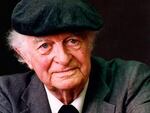
Linus Pauling
Linus Pauling Institute
Linus Pauling is considered one of the greatest chemists of the 20th century. A brilliant scientist and humanitarian he made revolutionary discoveries in chemistry, physics, molecular biology and medicine; then used his international fame and popularity to promote world peace.
Targeted by the FBI and labeled a Communist during the height of the Cold War, Linus Pauling is the only person in history to win two unshared Nobel Prizes.
Pauling was born in Portland, Oregon and spent his early childhood in the Eastern Oregon town of Condon. His father, Herman, was a self-taught pharmacist. His mother Belle, descended from Condon pioneers. When Linus was nine the family moved back to Portland where Linus attended Washington High School. His father died shortly thereafter and Belle opened a boarding house to support the family.
Young Pauling was drawn to chemistry at an early age when a friend showed him some chemical experiments in bedroom home laboratory. Linus decided to build his own lab in the basement of the boarding house where he performed his own chemical experiments.
He was determined to attend college and in 1917, prior to getting his high school diploma, he traveled to Corvallis to attend Oregon State University - then called Oregon Agricultural College. A brilliant student, he majored in Chemical Engineering and met the love of his life and future wife, Ava Helen Miller.
Pauling received his doctorate in Chemistry at the California Institute of Technology where he made revolutionary discoveries in chemistry, physics, molecular biology and medicine.
World War II would change Pauling's life dramatically. During the height of the Cold War, he and Ava Helen challenged the world to stop the spread of nuclear weapons. Pauling became one of the most visible scientists and peace activists in the 1950s and '60s. For his efforts he was labeled a Communist, had his name dragged through the mud, and endured more than 20 years of FBI investigation.
In the mid-60s Pauling's attention turned to studying how mega doses of vitamins and micronutrients could improve health and in 1970 he wrote the controversial best seller, Vitamin C and the Common Cold. The book - and Pauling - were heavily criticized by the FDA and the medical establishment. Many called Pauling a quack and a kook - a label that followed him the rest of his life.
Over a career that spanned nearly the entire 20th century, Pauling never backed down from his beliefs. He died in 1994, bequeathing all of his personal, professional papers and memorabilia - more than 500,000 items - to his alma mater Oregon State University. Today the Ava Helen and Linus Pauling Papers is one of the largest and most significant collections in the world.
Books
Thomas Hager, Force of Nature, The Life of Linus Pauling
Clifford Mead and Thomas Hager, Linus Pauling, Scientist and Peacemaker
Barbara Marinacci and Ramesh Krishnamurthy, Linus Pauling on Peace
Barbara Marinacci, Linus Pauling In His Own Words, Selections from His Writings, Speeches and Interviews
Linus Pauling, No More War!
Linus Pauling, Vitamin C and the Common Cold
Linus Pauling, How to Live Longer and Feel Better
Web sites
Oregon State University, Special Collections, The Ava Helen and Linus Pauling Papers
Linus Pauling and the Nature of the Chemical Bond
Linus Pauling and the International Peace Movement
Institute for Science, Engineering and Public Policy
California Institute of Technology Archives
Broadcast Date: May 30, 2011